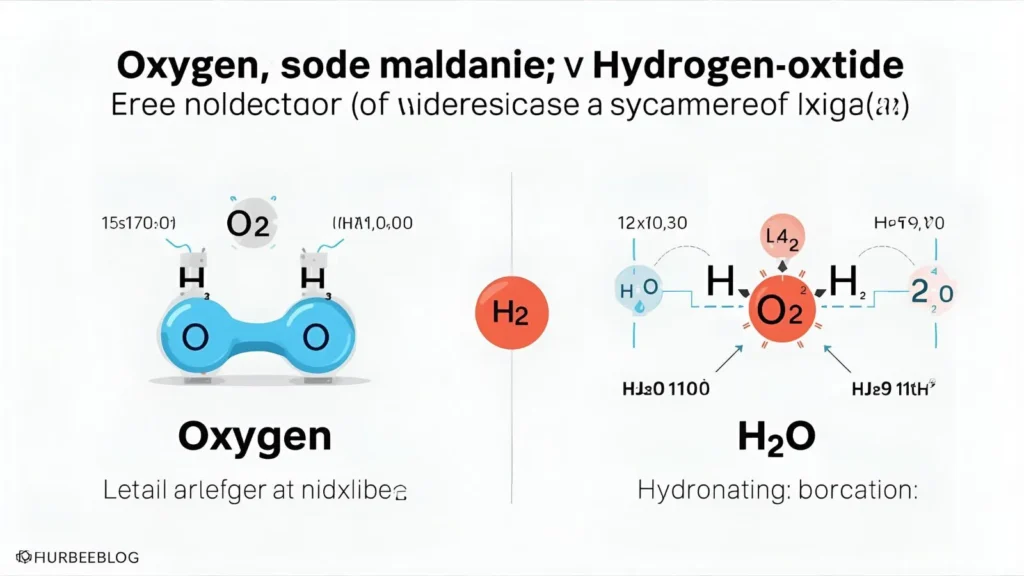Many people search for “oxegen vs hydrogen oxid” because these spellings often appear online, in notes, or in casual writing. At first glance, they may look correct, but in fact, both contain spelling mistakes. The correct scientific words are oxygen and hydrogen oxide (commonly known as water – H₂O). Still, confusion arises because people type these words phonetically, influenced by accents, or due to autocorrect errors.
This article clears up the difference, explains the correct spelling, and shows how each is used in British English, American English, and global contexts. If you’ve ever wondered whether “oxegen” is an accepted spelling or if “hydrogen oxid” is valid chemistry, this guide will answer your questions with examples, tables, and FAQs.
Oxegen vs Hydrogen Oxid – Quick Answer
- Oxegen ❌ → Incorrect spelling. The correct word is Oxygen.
- Hydrogen Oxid ❌ → Incorrect spelling. The correct form is Hydrogen Oxide (H₂O), which is simply water.
Example:
- Wrong: “Plants need oxegen to survive.”
- Correct: “Plants need oxygen to survive.”
The Origin of Oxegen vs Hydrogen Oxid
- Oxygen comes from the French word oxygène, first used in the 18th century by chemist Antoine Lavoisier.
- Hydrogen oxide is a chemical term for water, derived from Greek: hydro (water) + genes (creator).
- Misspellings like oxegen and oxid appear because of phonetic writing and confusion with chemical suffixes like “-ide” and “-ate.”
British English vs American English Spelling
Interestingly, oxygen and hydrogen oxide are spelled the same in both British and American English. The confusion comes from typos, not real spelling differences.
Comparison Table
| Variant | Correct? | Accepted Form | Notes |
|---|---|---|---|
| Oxegen | ❌ No | Oxygen | Common typo |
| Oxygen | ✅ Yes | Oxygen | Correct everywhere |
| Hydrogen Oxid | ❌ No | Hydrogen Oxide | Misses final “e” |
| Hydrogen Oxide | ✅ Yes | Hydrogen Oxide | Correct scientific spelling |
Which Spelling Should You Use?
- In the US → Always use oxygen and hydrogen oxide.
- In the UK/Commonwealth → Same rules; no alternative spellings exist.
- Globally → Use the correct scientific terms to avoid confusion.
Tip: Hydrogen oxide is rarely used in daily writing. People usually just say water.
Common Mistakes with Oxegen vs Hydrogen Oxid
- Writing oxegen instead of oxygen.
- Dropping the final e in oxide.
- Mixing oxide with oxidize (different meaning).
- Using hydrogen oxid in place of water.
- Thinking oxegen is a British spelling – it’s not.
Oxegen vs Hydrogen Oxid in Everyday Examples
- Emails: Wrong: “The body needs oxegen.” → Correct: “The body needs oxygen.”
- News Articles: Wrong: “Ice is a form of hydrogen oxid.” → Correct: “Ice is a solid form of water (H₂O).”
- Social Media: Misspellings appear often due to fast typing.
- Formal Writing: Always use scientific accuracy: oxygen and hydrogen oxide (water).
Oxegen vs Hydrogen Oxid – Google Trends & Usage Data
Search data shows:
- Oxygen dominates worldwide as the correct spelling.
- Oxegen peaks in searches only because people mistype.
- Hydrogen oxide is less searched since people prefer “water.”
- Hydrogen oxid barely appears, confirming it’s a mistake.
FAQs
Q1: Is oxegen ever correct?
No. The correct spelling is oxygen.
Q2: What is hydrogen oxid?
It is a misspelling of hydrogen oxide, which is just water (H₂O).
Q3: Do British people spell oxygen differently?
No. Both UK and US English use oxygen.
Q4: Why do people write oxegen?
Because they spell by sound, or it’s a typing error.
Q5: Is hydrogen oxide the same as water?
Yes. Chemically, H₂O is hydrogen oxide, but we call it water in daily use.
Q6: What’s the difference between oxide and oxidize?
- Oxide = compound with oxygen (e.g., iron oxide).
- Oxidize = chemical reaction with oxygen.
Q7: Which spelling should I use in academic papers?
Always use oxygen and hydrogen oxide (H₂O).
Conclusion
The debate around “oxegen vs hydrogen oxid” is actually about spelling mistakes, not true variations. The correct scientific terms are oxygen and hydrogen oxide (H₂O). Neither British nor American English accepts “oxegen” or “hydrogen oxid.”
If you’re writing for school, work, or publishing, always double-check spellings. Use oxygen in biological contexts and hydrogen oxide only in scientific or chemical discussions—otherwise, just say water.
Correct spelling builds credibility, avoids miscommunication, and shows attention to detail. Remember: while typos are common online, accuracy matters in education, science, and professional writing.


